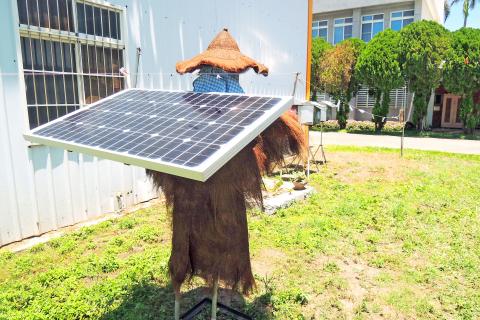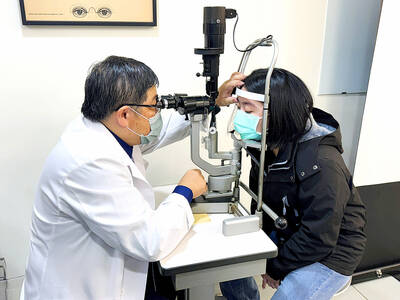Chirping sparrows are a constant headache for farmers, who fear more than anything that the birds will pilfer their rice paddy and millet farm harvests. The Taitung District Agricultural Research and Extension Station has come up with a “solar-powered dummy bird repellent.” Experimental farmland using the repellent had a 30 percent higher harvest rate than the average farm. Other advantages include protecting the environment by saving energy and economizing on labor.
Tseng Hsiang-en, an assistant researcher at the station, says that Taitung County has the greatest amount of farmland devoted to the cultivation of millet in all of Taiwan. Millet is also a special traditional crop among Aborigines, Tseng says. During the month before harvest, however, millet is often picked at by birds, Tseng says, adding that if no preventative measures are taken as much as 95 percent of the harvest can be lost.
Conventional farmers can only hire workers to physically drive away the birds, which Tseng says can cost up to NT$39,000 for each worker per hectare during a single harvest. Tseng says it is excruciating labor because each worker must stand under the sun for at least eight hours every day. Hopefully the new device will help lessen the burden for farmers, Tseng says. In three consecutive experimental millet harvests, the station discovered that preventative measures during the spring harvest for Asian rice were highly effective, Tseng says, adding that rice farms using the repellent had a 30 percent greater harvest than farms using only humans to drive away birds.

Photo: Chang Tsun-wei, Liberty Times
照片:自由時報記者張存薇
The bird repellent uses a solar-powered panel as its power source and stores power in an accumulator, allowing the device to run autonomously in the field. As soon as the first rays of sunlight hit at dawn, the circuit board detects even the slightest bit of power being generated in the solar-powered panel, and immediately flips a switch to start up a DC motor to power the scarecrow’s mechanized arms. A conducting wire is wrapped around the ends of the arms, which pulls on a noisemaker that makes sounds to imitate the way a human would try to scare off birds. At dusk the electricity switches off and the devices stops running.
In the event of unremitting cloudy or rainy conditions, Tseng says that, if the solar-powered panel does not produce enough electricity, an internal battery system provides a continuous power source. A utility model patent was acquired for the technology, which has been transferred to manufacturers, Tseng says.
(Liberty Times, Translated by Kyle Jeffcoat)
吱吱喳喳的麻雀總是讓農民傷透腦筋,水稻田、小米田最怕麻雀「搶收」。台東區農業改良場研發「太陽能人型驅鳥器」,試驗田收成率比一般田多三成,又有環保節能、省人力的優點。
台東農改場助理研究員曾祥恩說明,台東是台灣小米種植面積最大的縣份,小米更是原住民部落傳統特色作物,可是小米在收穫前一個月極易遭鳥類啄食,如果完全不防制,損失率高達九成五。
他說,傳統農民只能雇工以人力驅趕,但換算一公頃雇工每期成本高達新台幣三萬九千元,且一天至少要在太陽下工作八小時以上,實在很辛苦,所以研發這組設備,希望減輕農民負擔。連續三期稻作試驗中,也可發現水稻春作防制效果佳,採用太陽能人型驅鳥器的稻田,比人工驅鳥的稻田收成率多三成。
「太陽能人型驅鳥器」是以太陽能板發電,並可將電能儲存於電瓶,使機器在田間獨立自主運作。早上天色開始轉亮時,電路板可偵測太陽能板的微量發電,立刻啟動開關、以直流馬達驅動機械手臂,而手臂端綁上導線、可以拉動遠處的響片發出聲響,模擬人工驅鳥方式,黃昏後即停止發電及運作。
曾祥恩說,若遇連續陰雨,太陽能板發電量若不足,可透過內建電池系統持續供應電力,這項技術已獲新型專利保護,並將技術移轉給廠商。
(自由時報記者張存薇)

Bilingual Story is a fictionalized account. 雙語故事部分內容純屬虛構。 I stand by the Miluo River as dusk falls. The court betrayal is too much. I served Chu with loyalty. I forged alliances and fought corruption. But the whispers of jealous courtiers, the murmurs of treason, spoke louder. The king cast me out. The water looks calm. It promises peace. I step in. The river is cold against my legs. I hear shouts behind me — fishermen calling my name. I keep walking. The calls grow louder, but I do not turn around. The water rises to my chest. It pulls at me. I

A: Recently, I’ve been seeing mosquitoes flying around in front of my eyes. The doctor said it’s the “flying-mosquito disease.” B: Flying mosquitoes? What a strange name. A: They’re actually called “floaters” in English, meaning floating debris. When fibrous substances in the vitreous body inside the eyeballs increase, floaters can appear in the visual field. B: Oh my goodness. Can you get rid of them? A: According to ophthalmologist Horng Chi-ting’s research, taking the enzymes of certain fruits is likely to help reduce floaters. A: 我最近一直覺得眼前有蚊子飛來飛去,結果醫生說是「飛蚊症」。 B: 飛蚊症?好奇怪的病名。 A: 英文名稱叫「floaters」, 也就是漂浮物的意思。 因為眼球的玻璃體中纖維化物質增多,導致視野出現漂浮物。 B: 天啊!要怎麼把蚊子趕走? A:

In Taiwan, people can use a platform to rent a power washer for a weekend or share unused garage space for someone’s storage needs. These are examples of the sharing economy, a consumption model that has gained widespread adoption worldwide. This approach allows people to rent or share assets like cars, homes or even services, typically through online platforms. This innovative model poses a simple yet powerful question: why purchase infrequently used items when sharing is more practical? By making useful but idle resources accessible, the sharing economy turns them into sustainable opportunities. Internationally, platforms like Airbnb and Uber have popularized

1. 他們假裝不知道那件事。 ˇ They pretended not to know about it. ˇ They pretended that they didn’t know about it. χ They pretended to not know about it. 註:not 和 never 通常放在不定詞的前面。例如: I told him not to waste my time. I left early so as not to miss the plane. I trained myself never to lose my temper. 2. 他認為自己很誠實。 ˇ He considered himself to be strictly honest. χ He considered himself to strictly be honest. 註:strictly 在句中修飾 honest,不是修飾 be honest,因此不應放在 to be 之間,而且不定詞 to be 中間也不可以插入其他字。正句中的 to be 可省略。 3. 以前沒見過他,我當然認不出他。 ˇ Not having met him before, of course I did not recognize him. ˇ As I had not met him before, of